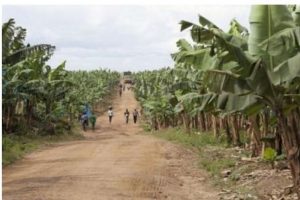
Despite the resumption of activities in 2020, and the loss of around 5,000 jobs out of 22,000, the CDC totals 35 billion FCFA in salary arrears at the end of June 2023, as well as a social debt to the CNPS (the public pension fund, Editor’s note)of 26.7 billion FCFA, according to the CTR. In 2019, this state company already estimated its financing needs at 29 billion FCFA, to be able to optimally relaunch its activities.
The member of the government, who attributes these steps to the implementation of the Integrated Agropastoral and Fisheries Import-Substitution Project (Piisah), did not reveal the identity of the partners with whom the State of Cameroon is negotiating financing to boost the production capacities of these agro-industrial units. However, we know that Sodecoton, of which the State holds 59% of the capital, and which supervises around 200,000 producers, has for several years been carrying out a program to increase its operational capacities. In particular through the construction of new storage warehouses, an 11th cotton ginning factory and a new oil mill. All these investments are being made with the prospect of an increase in cotton production to 600,000 tonnes by 2030, compared to around 350,000 currently.
Speaking this December 2024 before the Finance Committee of the National Assembly, during the defense of the State budget envelope for the 2025 financial year, the Minister Delegate to the Minister of the Economy revealed that the government is currently conducting “consultations with certain development partners, with the aim of relaunching the production capacities of certain agro-industrial companies”.
These include the Cotton Development Company (Sodecoton) and the Yagoua Rice Expansion and Modernization Company (Semry), two agro-industrial units located in the northern part of Cameroon. Paul Tasong also cites the Cameroon Development Corporation (CDC), the 2nd largest employer in Cameroon after the central administration, and Pamol Plantations PLC. Both of these companies are located in the southern part of the country.
The CDC and Pamol Plantations, in which the State holds 100% of the capital, have been in a bad situation since the outbreak of the socio-political crisis, which has shaken the North-West and South-West regions of Cameroon since at the end of 2016. In 2019, for example, Pamol Plantations Plc, which exploits oil palm in the South-West region of Cameroon, deplored an overall loss of 40 billion FCFA since the triggering separatist demands in the two English-speaking regions of the country. In fact, this company had to stop its activities, due to the intensification of clashes between the regular army and secessionist activists.
35 billion FCFA in salary arrears
This crisis put a brake on the vast investment program implemented within the company since 2015. This program notably provides for the acquisition of a palm oil production unit, with a capacity of 30 MT per hour. The construction of a soap factory and the extension of the company’s plantations over an area of 500 hectares in the Bakassi peninsula are also planned.
The CDC, which operates oil palm, bananas and rubber in the South-West and Littoral regions, also suffered the consequences of the so-called Anglophone crisis. It also had to stop its activities at one point, its plantations having been transformed into training camps by separatist activists. Between 2019 and 2021, the company accumulated losses of 38.7 billion FCFA, according to data from the Commission for the Rehabilitation of Public and Para-Public Sector Enterprises, a specialized body of the Ministry of Finance, whose activities have just started. be transferred to the reformed National Investment Company (SNI).
Semry, which supervises around 20,000 rice farmers in the northern part of Cameroon, produces barely 100,000 tonnes of rice annually, while Cameroon’s imports often reach 800,000 tonnes. At the end of a board meeting at the beginning of 2024, the managers of this public company projected production of 180,000 tonnes in 2024, counting mainly on the support of the Ministry of Agriculture and Urban Development (Minader). This, through the Logone Valley Development and Investment Development Project (Viva Logone), financed by the World Bank.
Source: Investing in Cameroon


